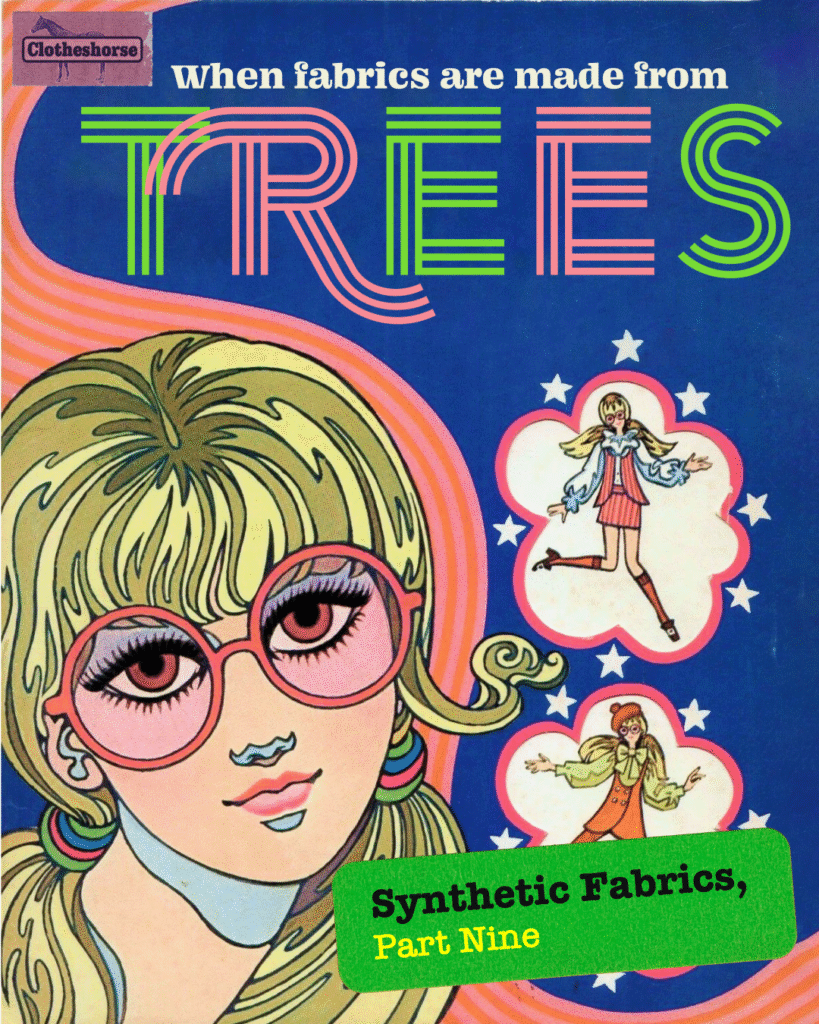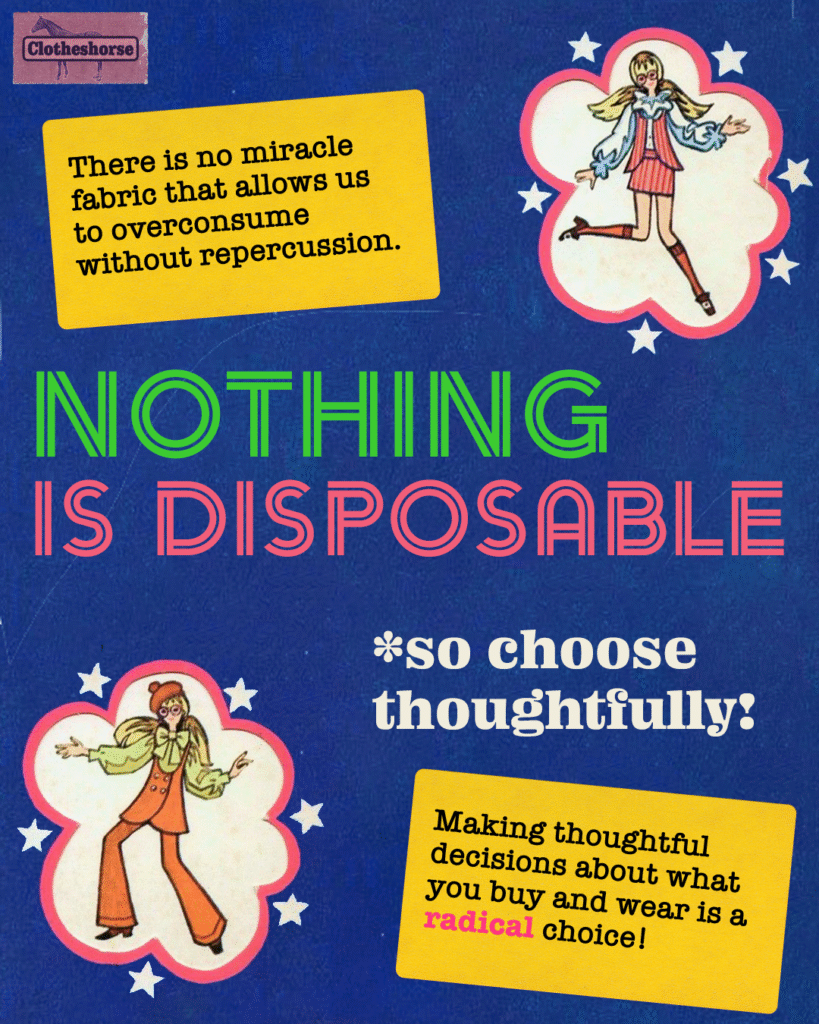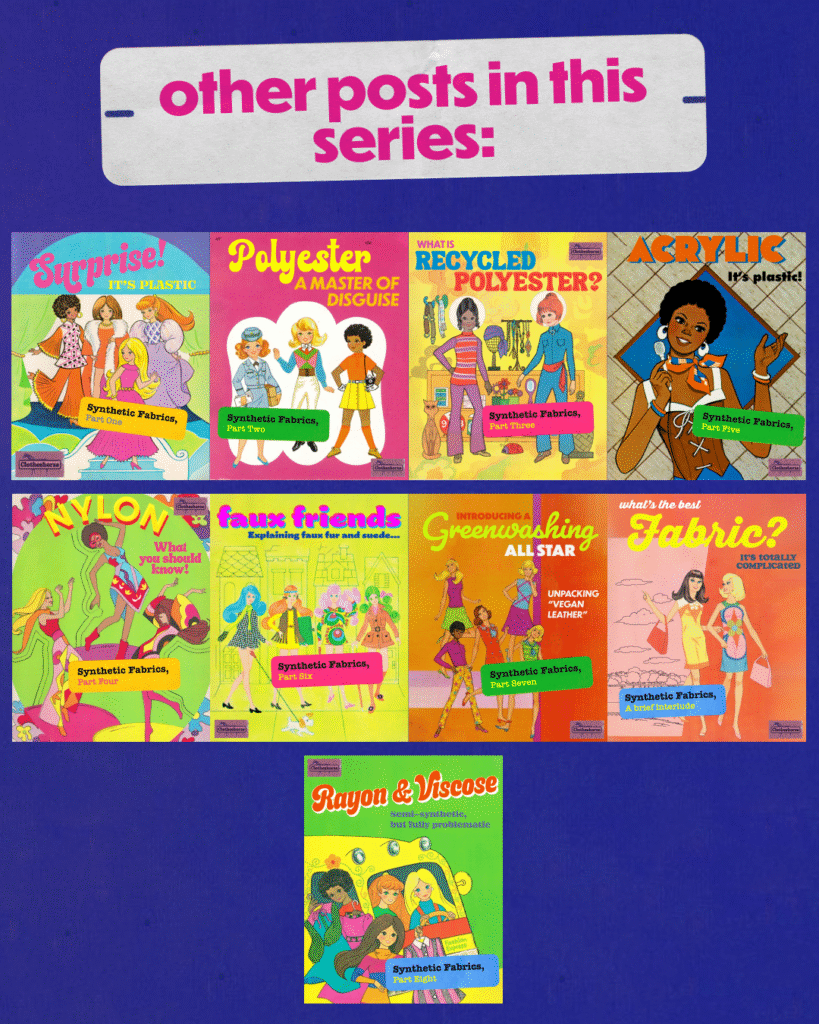
As I discussed in Part 8 of this series, semi-synthetic fabrics (also know as “man-made cellulosic” fabrics) are made from materials like wood pulp and bamboo, using some pretty intense chemicals and processes.
When tree pulp is used, about 60% of the tree is lost/wasted in the process. Yes, clothing is contributing to deforestation! In moderation, it wouldn’t be such a problem, but…right now nothing is being made and consumed in moderation.
Modal is a form of viscose/rayon that goes through an additional process to make it somewhat stronger than regular viscose.
More breathable and durable than standard viscose/rayon.
Often used for bedsheets, yoga pants, swimwear, and bike shorts.
Designed to hold its shape and color when washed in warm water.
The process for making modal is virtually identical to producing viscose. Trees (often beech) are harvested, turned into chips, and then the cellulose is extracted
Sodium hydroxide and carbon disulfide help turn the cellulose into a viscous solution via a series of processes, including pressing, shredding, crumbing, mixing, exposure to oxygen, and aging.
The viscous liquid is filtered, degassed, and extruded through a spinneret into in a bath of sulfuric acid.
The resulting yarn is washed, bleached, dried, and spun into yarn. At this point, the yarn is subjected to other chemical treatments like pre-shrinking, fire resistance, wrinkle resistance, anti-odor, etc. Then it is woven into fabric and dyed/printed.
Kinda? By now you know all things clothing and fabric related are complicated.
There are some aspects of modal that make it slightly better than regular viscose/rayon: less chemicals are used throughout the process, the fabric is more durable and washable, and many manufacturers have developed processes that help mitigate release of toxic chemicals into the ecosystem.
However, we also know that the production of viscose/rayon is an environmental justice issue. There are manufacturers who are thoughtful/careful and others who are reckless/polluting. Lenzing TENCEL modal is a name brand that has a lower environmental impact. Look for that on labels.
The lyocell method of making viscose is generally considered a more sustainable (but not perfect) alternative.
Very strong, soft, and breathable.
Often blended with other fibers like cotton and polyester. The resulting fabric is super strong.
Also used for medical dressings, filtration devices, and conveyor belts.
Lyocell viscose begins as hardwood trees like birch and oak. The trees are turned into chips and then softened into pulp with chemical digesters.
The pulp is washed/bleached, dried into a sheet, and then rolled into spools. The spools are broken into little squares. These squares are turned into liquid after being placed in pressurized vats of amine oxide. The solution is filtered and forced through spinnerets, turned into thread, and then washed. Next, the threads are treated with a lubricant like soap or silicon and then carded.
This process is “closed loop,” meaning that the chemicals are reused.
Look for TENCEL (made by Lenzing) or Birla Excel for true lyocell options.
Overproducing and overconsuming clothes made from trees leads to deforestation.
In some ways this is similar to the relationship between paper consumption and trees…but the big difference is that paper is widely recycled, while fabric currently is not.
Some manufacturers (like Lenzing and Birla) are committed to strategic, thoughtful tree harvesting. And other producers are working on reusing tree waste and discarded textiles.

Will I wear this often and will I wear it for years?
Can I wear this comfortably and regularly in the climate I live in?
Does this fabric/garment work with my own personal concerns?
Am I willing to care for this properly, whether it’s hand washing, dry cleaning, line drying, ironing, etc?
If it’s synthetic, am I committed to dealing with microplastic shedding?
And lastly, do I love this garment enough to mend and repair it?
The most sustainable thing you can do? Extend the life of your clothing via care and repair (and then wear it over and over again). Here’s how to care for your lyocell/modal/TENCEL clothing:
Wash in a gentle cycle using cold water. Or hand wash!
Choose air drying as often as possible. If that’s not an option, use the lowest setting on the dryer and don’t let the load run until the clothing feels warm.
To remove wrinkles, use the lowest setting on your iron…or hang it in the bathroom when you take a shower!

Images in this post came from the 1970 “New N Groovy PJ” paper doll book.
If you want to share your opinion/additional thoughts on the subjects we cover in each episode, feel free to email, whether it’s a typed out message or an audio recording: [email protected]
Slow Fashion Academy is a size-inclusive sewing and patternmaking studio based in Philadelphia, Pennsylvania. Designer and fashion professor Ruby Gertz teaches workshops for hobbyists and aspiring designers, so that anyone can learn the foundational skills of making, mending, and altering their own clothes. Ruby also provides professional design and patternmaking services to emerging slow fashion brands, and occasionally takes commissions for custom garments and costume pieces. She has also released several PDF sewing patterns for original designs under her brands Spokes & Stitches, and Starling Petite Plus. Check the schedule for upcoming workshops, download PDF sewing patterns, and learn about additional sewing and design services at www.slowfashion.academy.
Thumbprint is Detroit’s only fair trade marketplace, located in the historic Eastern Market. Our small business specializes in products handmade by empowered women in South Africa making a living wage creating things they love like hand painted candles and ceramics! We also carry a curated assortment of sustainable/natural locally made goods. Thumbprint is a great gift destination for both the special people in your life and for yourself! Browse our online store at thumbprintdetroit.com and find us on instagram @thumbprintdetroit.
Picnicwear: a slow fashion brand, ethically made by hand from vintage and deadstock materials – most notably, vintage towels! Founder, Dani, has worked in the industry as a fashion designer for over 10 years, but started Picnicwear in response to her dissatisfaction with the industry’s shortcomings. Picnicwear recently moved to rural North Carolina where all their clothing and accessories are now designed and cut, but the majority of their sewing is done by skilled garment workers in NYC. Their customers take comfort in knowing that all their sewists are paid well above NYC minimum wage. Picnicwear offers minimal waste and maximum authenticity: Future Vintage over future garbage.
Shift Clothing, out of beautiful Astoria, Oregon, with a focus on natural fibers, simple hardworking designs, and putting fat people first. Discover more at shiftwheeler.com
High Energy Vintage is a fun and funky vintage shop located in Somerville, MA, just a few minutes away from downtown Boston. They offer a highly curated selection of bright and colorful clothing and accessories from the 1940s-1990s for people of all genders. Husband-and-wife duo Wiley & Jessamy handpick each piece for quality and style, with a focus on pieces that transcend trends and will find a home in your closet for many years to come! In addition to clothing, the shop also features a large selection of vintage vinyl and old school video games. Find them on instagram @ highenergyvintage, online at highenergyvintage.com, and at markets in and around Boston.
St. Evens is an NYC-based vintage shop that is dedicated to bringing you those special pieces you’ll reach for again and again. More than just a store, St. Evens is dedicated to sharing the stories and history behind the garments. 10% of all sales are donated to a different charitable organization each month. New vintage is released every Thursday at wearStEvens.com, with previews of new pieces and more brought to you on Instagram at @wear_st.evens.
Deco Denim is a startup based out of San Francisco, selling clothing and accessories that are sustainable, gender fluid, size inclusive and high quality–made to last for years to come. Deco Denim is trying to change the way you think about buying clothes. Founder Sarah Mattes wants to empower people to ask important questions like, “Where was this made? Was this garment made ethically? Is this fabric made of plastic? Can this garment be upcycled and if not, can it be recycled?” Signup at decodenim.com to receive $20 off your first purchase. They promise not to spam you and send out no more than 3 emails a month, with 2 of them surrounding education or a personal note from the Founder. Find them on Instagram as @deco.denim.
The Pewter Thimble Is there a little bit of Italy in your soul? Are you an enthusiast of pre-loved decor and accessories? Bring vintage Italian style — and history — into your space with The Pewter Thimble (@thepewterthimble). We source useful and beautiful things, and mend them where needed. We also find gorgeous illustrations, and make them print-worthy. Tarot cards, tea towels and handpicked treasures, available to you from the comfort of your own home. Responsibly sourced from across Rome, lovingly renewed by fairly paid artists and artisans, with something for every budget. Discover more at thepewterthimble.com
Blank Cass, or Blanket Coats by Cass, is focused on restoring, renewing, and reviving the history held within vintage and heirloom textiles. By embodying and transferring the love, craft, and energy that is original to each vintage textile into a new garment, I hope we can reteach ourselves to care for and mend what we have and make it last. Blank Cass lives on Instagram @blank_cass and a website will be launched soon at blankcass.com.
Vagabond Vintage DTLV is a vintage clothing, accessories & decor reselling business based in Downtown Las Vegas. Not only do we sell in Las Vegas, but we are also located throughout resale markets in San Francisco as well as at a curated boutique called Lux and Ivy located in Indianapolis, Indiana. Jessica, the founder & owner of Vagabond Vintage DTLV, recently opened the first IRL location located in the Arts District of Downtown Las Vegas on August 5th. The shop has a strong emphasis on 60s & 70s garments, single stitch tee shirts & dreamy loungewear. Follow them on instagram, @vagabondvintage.dtlv and keep an eye out for their website coming fall of 2022.
Country Feedback is a mom & pop record shop in Tarboro, North Carolina. They specialize in used rock, country, and soul and offer affordable vintage clothing and housewares. Do you have used records you want to sell? Country Feedback wants to buy them! Find us on Instagram @countryfeedbackvintageandvinyl or head downeast and visit our brick and mortar. All are welcome at this inclusive and family-friendly record shop in the country!
Located in Whistler, Canada, Velvet Underground is a “velvet jungle” full of vintage and second-hand clothes, plants, a vegan cafe and lots of rad products from other small sustainable businesses. Our mission is to create a brand and community dedicated to promoting self-expression, as well as educating and inspiring a more sustainable and conscious lifestyle both for the people and the planet. Find us on Instagram @shop_velvetunderground or online at www.shopvelvetunderground.com
Selina Sanders, a social impact brand that specializes in up-cycled clothing, using only reclaimed, vintage or thrifted materials: from tea towels, linens, blankets and quilts. Sustainably crafted in Los Angeles, each piece is designed to last in one’s closet for generations to come. Maximum Style; Minimal Carbon Footprint.
Salt Hats: purveyors of truly sustainable hats. Hand blocked, sewn and embellished in Detroit, Michigan.
Republica Unicornia Yarns: Hand-Dyed Yarn and notions for the color-obsessed. Made with love and some swearing in fabulous Atlanta, Georgia by Head Yarn Wench Kathleen. Get ready for rainbows with a side of Giving A Damn! Republica Unicornia is all about making your own magic using small-batch, responsibly sourced, hand-dyed yarns and thoughtfully made notions. Slow fashion all the way down and discover the joy of creating your very own beautiful hand knit, crocheted, or woven pieces. Find us on Instagram @republica_unicornia_yarns and at www.republicaunicornia.com.
Cute Little Ruin is an online shop dedicated to providing quality vintage and secondhand clothing, vinyl, and home items in a wide range of styles and price points. If it’s ethical and legal, we try to find a new home for it! Vintage style with progressive values. Find us on Instagram at @CuteLittleRuin.